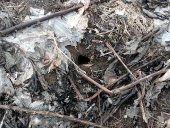Cristo Balete wrote:I had the same problem with hugel mounds. The rodents were thrilled, everything dried out worse than ever.
I switched over to hugel pits, as deep as my patience allows at the time. Even just one shovel blade deep works. I soak the wood first, try to fill it in with a mixture of stuff. I mound it a little, because it will settle. Mulch it thickly with mowed stuff. Then it doesn't matter if they get into it from below because the sun isn't involved, there are fewer creatures in a wet and damp zone like a hugel pit.
Very interesting indeed. Thanks for sharing. So the final result is a bed on ground level, slightly raised, or pitted? I think a slightly raised bed is better for my climate in center Italy. Our summer used to be low rainfall but the last 5 years have been very rainy and stormy. It rained heavily and damaged urban sites and coltures everywhere. Working with raised beds saved my garden from rotting in a heavy clay soil. Next time I have woody materials I will make a new hugelkultur (or maybe I will dismantle the one I have rodents in..), and bury the woods and other green materials in a pit as you suggest, while taking care of filling all the holes. That will be a reservoire for water and slow release nutrients.
Having a problem with slugs as well I will not use straw for mulching. Maybe I will just not add anything as mulch to the hugelkultur beds at all and plant only thickly (living mulch), cut everything and let the roots rot inside while taking the air portion of the plant to the compost heap. Then make compost for my other NON Hugelkultur raised beds to use as a mulch (which fertilizes the soil as well) once a year.
I will use black compost through the winter/spring, and only when the sun is too hot in summer, and the plants are grown a little more, I may be adding some straw to decrease soil temp and evaporation.
The point in hugelkultur is that against a big amount of work up front you get fertility (nutrients and water) for many years with less work. So I won't make compost for these.
What do you think guys?





